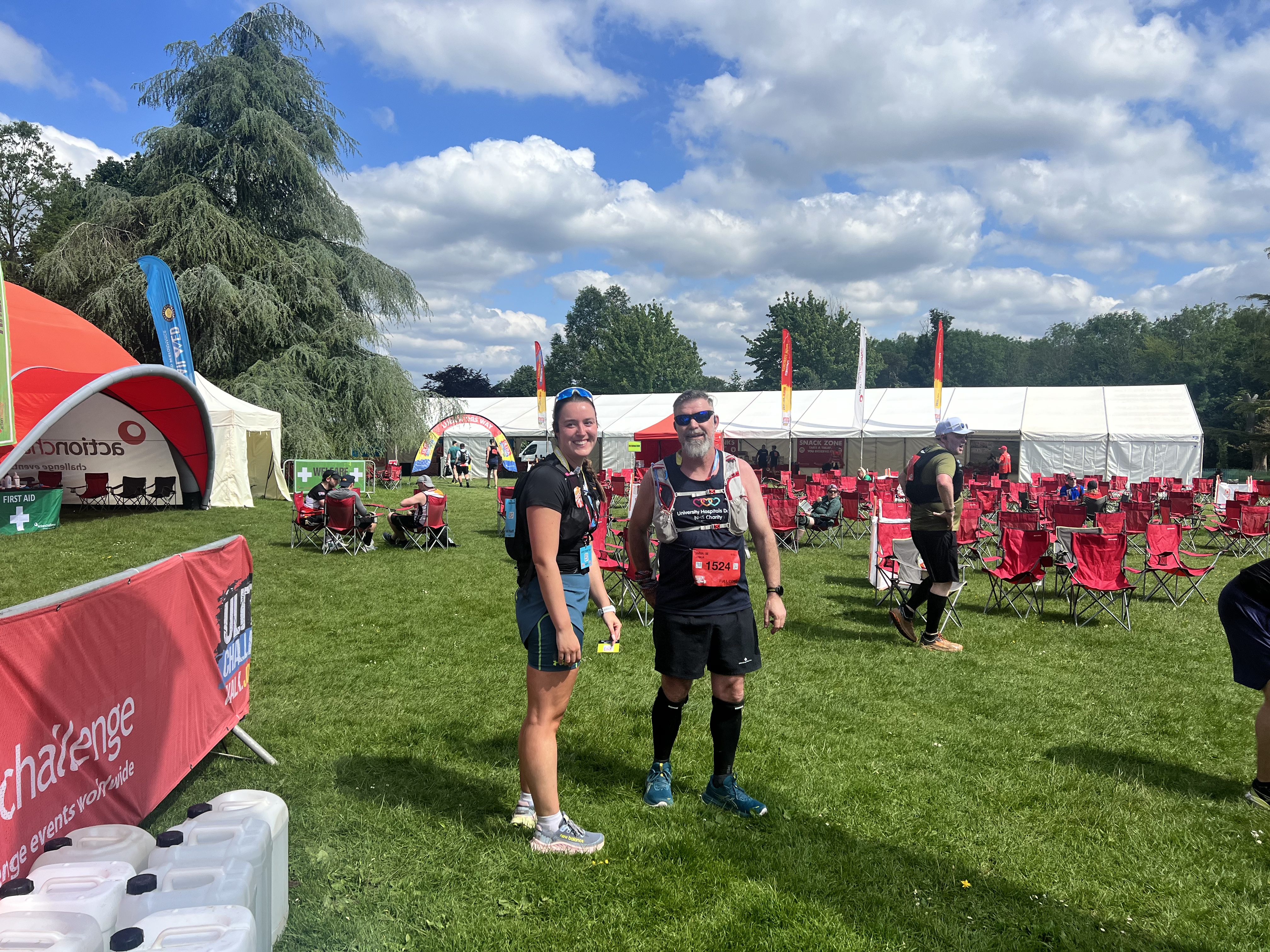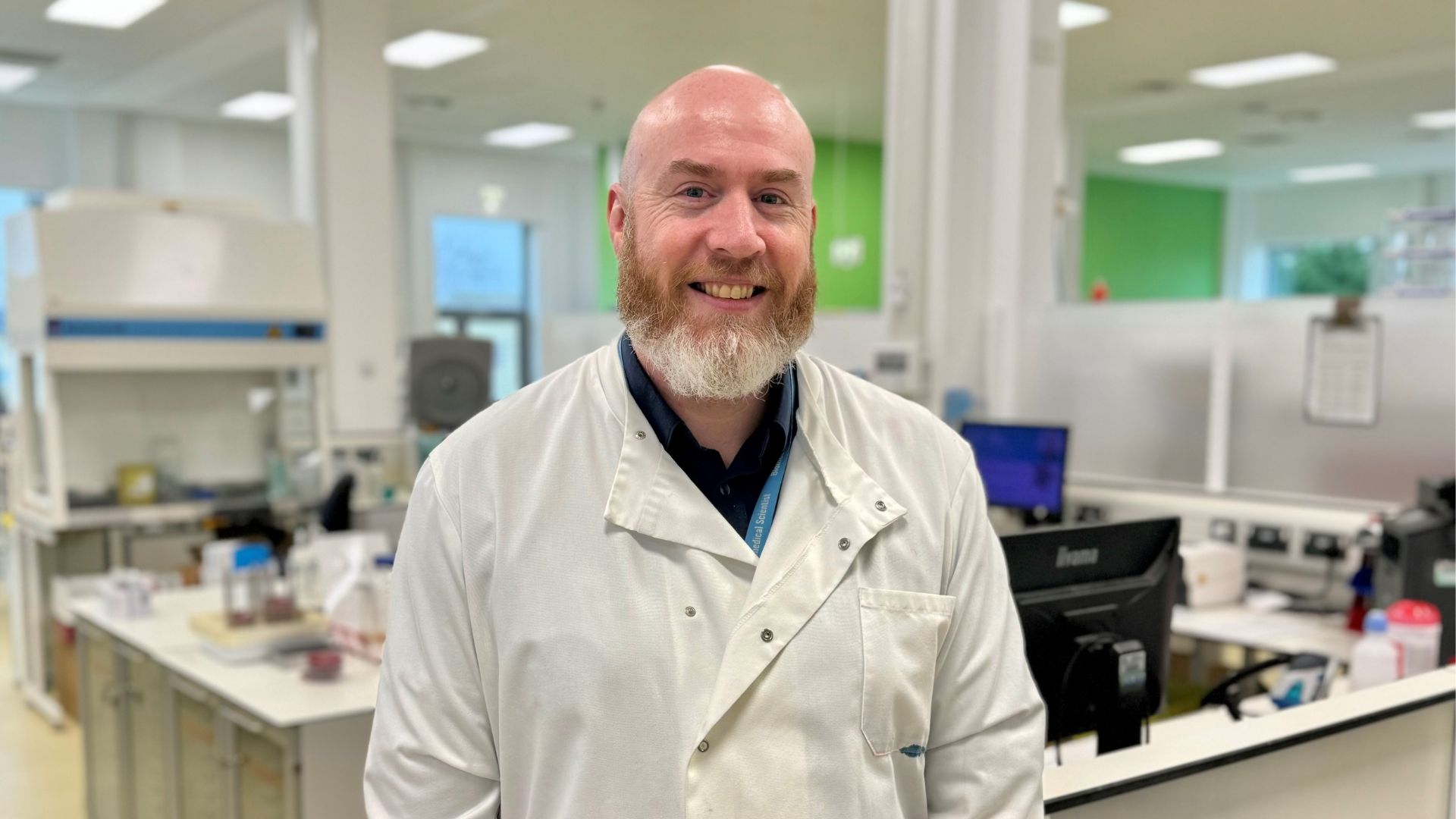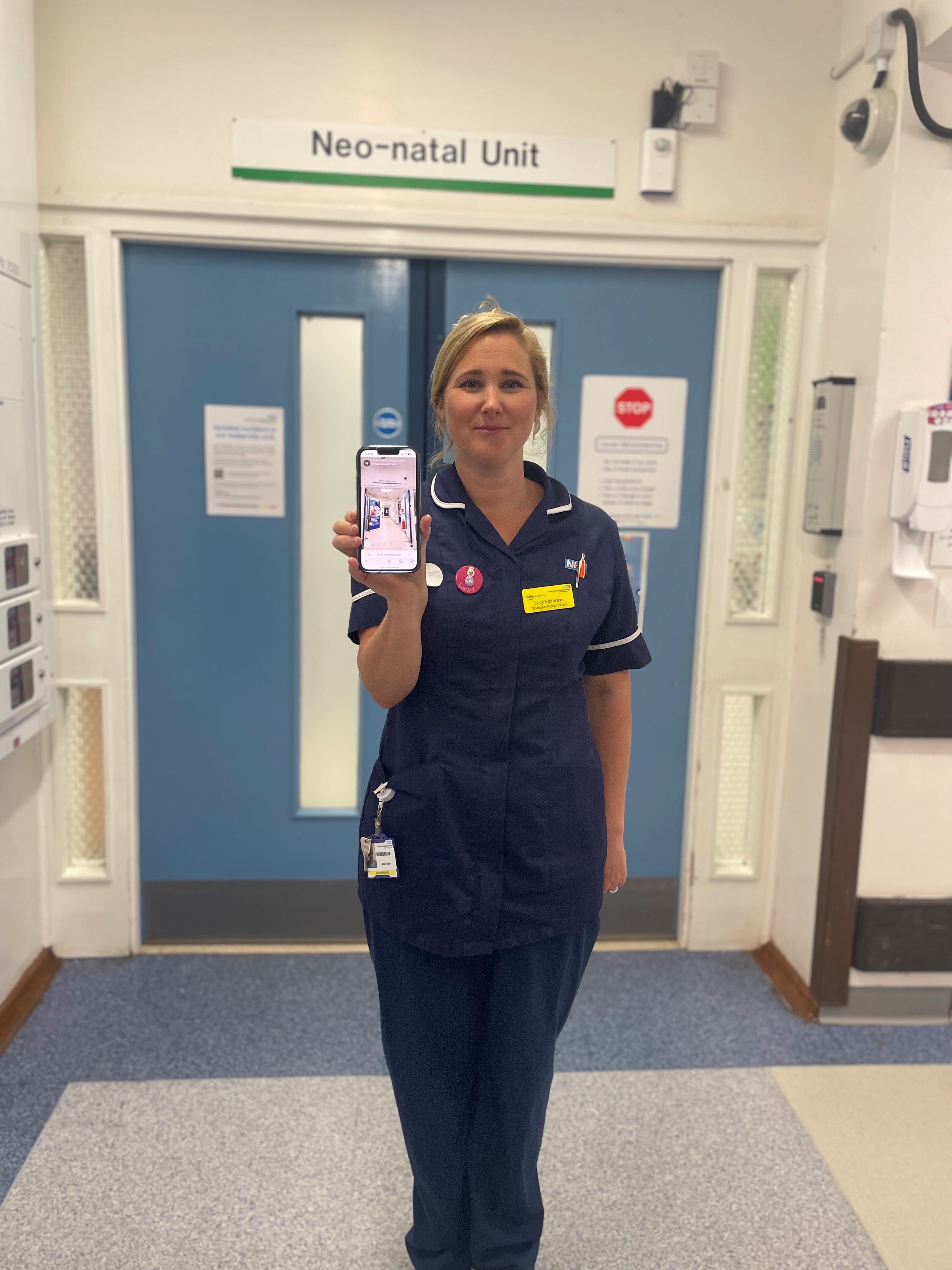On Saturday 25 May 2024, 50-Year-old John McDermott laced up his trainers to tackle a 100km trail run from London to Brighton.
As he raced towards the finish line, it wasn’t just the sweat and blisters at the front of John’s mind. He was running in tribute to his son Alfie who sadly passed away in June 2018.
Alfie was just seven-years old when he was taken into Poole Hospital and treated for severe anxiety induced asthma but tragically, his airways did not open, and he unexpectedly died that day.
John and Jen McDermott and their wider family were supported by Gully’s Place – a service that has been developed to support children and young people with life-limiting conditions.
Funded by University Hospitals Dorset NHS Charity, Gully’s Place offers families a private place within a hospital setting, with the reassurance and comfort of having expert care at hand. Located on the children’s ward, the suite also provides home-from-home accommodation and a place of privacy and dignity for end-of-life care and newly bereaved families.
Jen said: “The time, the space, the amazing care and the privacy we were given through Gully’s Place is something so special to us. I can’t tell you how much that meant to us during those unbearable moments.”

“The facilities and set-up at Gully’s Place meant our youngest son, Harry who was only six at the time, could choose where he wanted to be that day but still be with his family. While we could say goodbye to Alfie, Harry had the time to process what was going on and was not forced to see Alfie until he was ready. All of this was made possible with Gully’s Place.”
And almost six years on, Alfie’s memory shines bright in the McDermott household with the warmest of memories and photos of Alfie’s unforgettable smile. While Alfie will remain in their hearts forever and the devastation doesn’t go, this loving family are hoping to help other parents who experience a similar tragedy or need this type of support.
John said: “I took on this crazy challenge to help raise awareness of Gully’s Place – a place we couldn’t have been without that day. I channel my energy into challenges like this as part of the forever grieving process - but this was by far, my biggest challenge yet!”
“I did it for Alfie and every parent out there whoever experiences the same tragedy as us and needs the support of services like Gully’s Place. People simply need to know it’s there.”
On Saturday 25 May, John was cheered on every step of the way by his wife Jennifer and their son, Harry (11 years) and daughter Maebha (4 years) as he approached the end of this epic race in Brighton.
Running by his side for the first half of this epic challenge was close friend, Jessica Richens who wanted to support Gully’s Place and the McDermott family.

Understanding pathology: health under the microscope
On 4 June, expert speakers Nathan Bourne, Biomedical Scientist and Pathology Governance and Quality Manager at University Hospitals Dorset (UHD) NHS Foundation Trust and Dr Anna Mantzouratou, Principal Academic in Human Genetics at Bournemouth University (BU) discussed the role pathology plays in healthcare.
Nathan Bourne spoke about the new Dorset Pathology Hub, the different laboratories and their purpose. He shared a video of Steve Hior’s patient experience which highlights how the hub provides a more personalised approach to healthcare.
In addition to this, he spoke about the digitalisation of pathology and the advances of artificial neural networks and machine learning (using artificial intelligence) for early detection and diagnosis of diseases such as cancer, helping shorten waiting times for diagnosis. Further advancements include using heat mapping (thermography) in Breast Cancer Screening to detect tumour tissue. He said, “We’re here to save lives, every sample there is a patient on the end of it, we’re here to support their journey through healthcare.”
Dr Anna Mantzouratou followed with her presentation ‘There is no one like you’. Her main area of research is looking at the genetics of early human embryos and gametes, and the genetics of antimicrobial resistance. She spoke about media coverage of artificial human cloning and genetic engineering (the modification of an organism’s genes using technology).
Additionally, she spoke about modern-day access to a wealth of information about our genes and ancestry through direct-to-consumer genetic testing and how genetic information can be used for health prognosis and treatment. Furthermore, she spoke about preimplantation genetic testing and how our genes as well as environmental factors can impact fertility.
She said, “The collaboration between University Hospitals Dorset NHS Foundation Trust and Bournemouth University is of mutual benefit. We need patients to conduct our research and find out what is needed. It also equips us with knowledge and understanding to train students to work in hospitals and healthcare environments. Education, training, and research will support developments in pathology.”
You can watch the recording of this event and previous Understanding Health talks which discussed ‘Understanding Menopause’ and ‘Understanding Concussion in Sport and Practice’ on the University Hospitals Dorset NHS Foundation Trust website.
‘New era’ for patient care as Dorset Pathology Hub officially opens
A 'new era' in medical diagnostics and patient care in Dorset was celebrated as NHS staff and partners gathered on Wednesday (22 May), to witness patient Steve Hiorns officially open the state-of-the-art Dorset Pathology Hub.
The new £24m facility is equipped with the latest specialist technology, ensuring high-quality, cost-effective diagnostics and care for patients across the region.
The Hub is already making a significant impact, particularly through the benefits of personalised medicine and the implementation of AI and deep learning in cancer diagnostics.
Dr. Katie Adie CBE DL, broadcaster and Chancellor of Bournemouth University, unveiled a commemorative plaque to mark the occasion.
Steve Hiorns, the patient whose blood was the first to be analysed at the hub, cut a ribbon to officially open the facility.
Mark Mould, UHD’s chief operating officer and the project’s senior responsible officer, expressed his gratitude during the celebration event:
“This is a special day as we celebrate a new era for our local NHS and the patients we serve.
“Delivering a project of this scale is a true team effort, and we are grateful for the support of our partners, many of whom were able to join us at the event.
“This project has not just been about buildings but building futures – the Hub improves diagnostics for patients, helping to meet the growing demand for specialist treatment, as well as providing development opportunities for staff.”
The new facility is located on the Wessex Fields site next to the Royal Bournemouth hospital and is part of the One Dorset Pathology network - a collaborative partnership between Dorset County Hospital and University Hospitals Dorset.
The project has been backed by the Dorset Local Enterprise Partnership (LEP), which supported the project with a £2.7 million Local Growth Fund investment in the histopathology diagnostic hub as part of its initiatives to support Covid-19 recovery and accelerate healthcare resilience in the county.
Commenting on the new state-of-the-art Dorset Pathology Hub official opening, Cecila Bufton, chair of the Dorset LEP Board said:
“It is a proud moment for Dorset LEP to witness the impact our £2.7m investment into the histopathology diagnostic service is having on the health and communities right across Dorset.
“The state-of-the-art laboratory at Royal Bournemouth Hospital supports hospitals across the region, offering a fast, accurate, routine and specialist testing service.
“Having started my career in laboratory diagnostics, I am fully aware how such a service can make a significant difference to health outcomes for people in Dorset.”
Jon Daines, managing director of Amiri Construction, added:
"We are thrilled to have completed this project and are immensely proud of the hard work and dedication that brought us to this point. This state-of-the-art Pathology Hub will significantly enhance diagnostic services for NHS teams across Dorset, providing cutting-edge resources that will greatly benefit the community.
"Amiri Construction, a regional contractor based in both Bournemouth and Segensworth near Fareham, has been serving the central south region for nearly 20 years. We pride ourselves on predominantly focusing on the local supply chain, with over 80% of our suppliers for the Pathology Hub project located within 25 miles of the project, keeping the economy within the local area.
"Despite the challenges of starting this build during a global pandemic and facing increased price rises, our team’s dedication and collaborative efforts made this project a success. We are incredibly proud of the building and its future impact on NHS teams across Dorset."
The Hub opened in November 2023, with the molecular pathology the first team to move in. It currently works to process over 9 million tests per year, diagnose conditions in around 80% of all patients seen by the NHS and employs 200 staff - offering 24/7 365 days a year support.


Statement on Infected Blood Inquiry Report
Responding to the publication of the Infected Blood Inquiry Report, Amanda Pritchard, Chief Executive of NHS England, said:
“Earlier today, the Infected Blood Inquiry published its final report. The Prime Minister has subsequently issued an apology on behalf of successive Governments and the entire British state. I want to do the same on behalf of the NHS in England now, and over previous decades.
“Today’s report brings to an end a long fight for answers and understanding that those people who were infected and their families, should never have had to face.
“We owe it to all those affected by this scandal, and to the thorough work of the Inquiry team and those who have contributed, to take the necessary time now to fully understand the report’s conclusions and recommendations.
“However, what is already very clear is that tens of thousands of people put their trust in the care they got from the NHS over many years, and they were badly let down.
“I therefore offer my deepest and heartfelt apologies for the role the NHS played in the suffering and the loss of all those infected and affected.
“In particular, I want to say sorry not just for the actions which led to life-altering and life-limiting illness, but also for the failures to clearly communicate, investigate and mitigate risks to patients from transfusions and treatments; for a collective lack of openness and willingness to listen, that denied patients and families the answers and support they needed; and for the stigma that many experienced in the health service when they most needed support.
“I also want to recognise the pain that some of our staff will have experienced when it became clear that the blood products many of them used in good faith may have harmed people they cared for.
“I know that the apologies I can offer now do not begin to do justice to the scale of personal tragedy set out in this report, but we are committed to demonstrating this in our actions as we respond to its recommendations.
“While we work through those actions, we continue to work with the Department of Health and Social Care to establish a bespoke psychological support service for those affected, which will be ready to support its first patients later this Summer.
“In the meantime, anyone who has health concerns can find information and support services at www.nhs.uk/infected-blood-support.
“Finally, while the long-term impacts of this scandal are far from over, I want to reassure patients needing blood and blood products today that rigorous modern safety standards continue to ensure that the NHS blood supply is now among the safest in the world, so please do continue to access treatment, and speak to your care team if you have any concerns.”
Background
-
Today, blood is distributed to NHS hospitals by NHS Blood and Transplant (NHSBT), which was established in 2005 to provide a national blood and transplantation service to the NHS.
-
NHSBT’s services follow strict guidelines and testing to protect both donors and patients, and are subject to regular inspections by independent regulators. All donors complete an extensive donor health check questionnaire before each blood donation, with potential donors considered at risk of passing on an infection being asked to defer donating until it is safe for them to do so, and all donations are then routinely tested for hepatitis B, hepatitis C, hepatitis E, human immunodeficiency virus, syphilis and for first time donors, human T-lymphotropic virus, before they are released to hospitals.
New virtual tour lets families walk round Poole neonatal unit
A virtual tour of the Poole Hospital neonatal unit has gone live, enabling families to ‘visit’ the ward and get a better understanding of what to expect if their child needs neonatal care.
The 3D tour is available on the hospital trust’s website and can either be watched in one go or navigated at the user’s own pace. Information tags have been added to explain the different areas of the neonatal unit and the equipment to help people familiarise themselves with the clinical area.

Lucy Fairbrass, deputy sister for the unit, said: “Within the tour they will see the layout of the unit and can hear typical sounds of the clinical environment. There are informational tags that identify medical equipment used, areas parents would access frequently and facilities available for families if they have a baby on the neonatal unit.
“We hope the tour will help potential families prepare and know a little more about what to expect if their baby needs specialist care from our team at Poole. Our hope is that this will help families to visualise where their baby will be cared for, reduce uncertainty and therefore increase the family's wellbeing.”
You can watch the Poole tour at https://www.uhd.nhs.uk/services/maternity/poole/neonatal-unit
The tours can also be used by families whose children were cared for previously in the unit, and were produced in collaboration with the Thames Valley and Wessex Neonatal Partnership, which is working towards having tours of all 14 units in region. See more at https://neonatalnetworkssoutheast.nhs.uk/unit-information/









